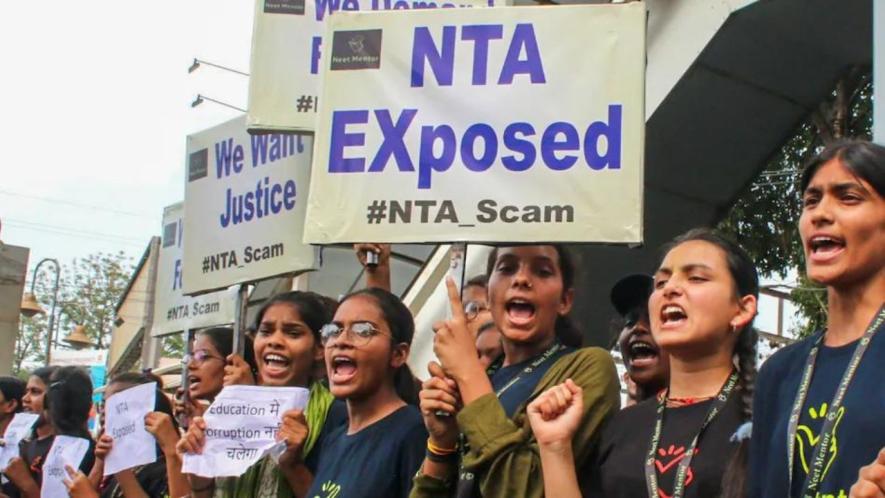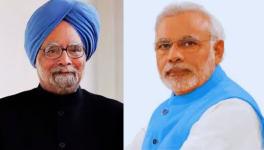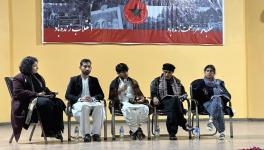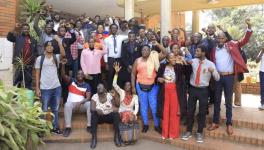Political Economy of the NTA Fiasco

Image Courtesy: PTI
The neoliberal project in India has involved a persisting undermining of Indian education. A programme for this subversion is set out in the National Education Policy of 2020. By making Indian education a venue to further the (primitive) accumulation of capital, the Indian government (especially the neo-fascist dispensation) has struck a triple blow to Indian development.
First, the commodification of education (primarily but not exclusively through privatisation and reduction in public funding) has led to the exclusion of students especially those from the oppressed strata.
Second, profiteering by private educational institutions involves the substitution of short-term profits for long-term profits where a more inclusive educational process with public funding could have enabled the possibility of India ascending the technological ladder that concerns global production networks.
Third, saffronisation of education that involves, among other things, an attempt to manufacture consent for the first blow (and the neo-fascist dispensation too) which also strengthens the deleterious impact of the second blow. The ongoing fiasco with respect to the shenanigans of the National Testing Agency (NTA) is emblematic of this triple blow. Let’s see how.
To begin with, the neo-fascist dispensation has sought to position the NTA as the sole conductor of entrance exams for almost all public higher educational institutions. This has resulted in the emergence of usually multiple choice-based questions (based on varying degrees of saffronised content) for every type of course. This has increased profiteering by private coaching institutes and a disproportionate exclusion of (the majority of) students who evidently cannot afford private coaching.
Arguably there seems to be a deliberate disjunction between school/college/university syllabi and the contents of NTA conducted under-graduate/post-graduate/PhD entrance tests in order to ensure that there is adequate demand for private coaching institutes. Implicitly, the neo-fascist dispensation seeks to create “spontaneous” pressure “from below” for homogenisation of education which is equivalent to saffronisation of education in the Indian context.
The example of the National Eligibility-cum-Entrance Test NEET) in Tamil Nadu illustrates the deleterious consequences of the centralisation of admission processes. NEET has superseded all other modes of admitting students, such as marks secured in school exams and medical entrance exams conducted at the state level. This move, which is also an anti-federal move, has undermined rural healthcare in Tamil Nadu as well as exacerbated the exclusion of students from oppressed strata. Let’s see how.
Students from rural government schools (where students from oppressed strata are concentrated) have been the hardest hit. Previously, students from rural government schools, after completing their medical education, were quite willing to practice medicine in rural areas where their families were located. As enrolment of such students (who cannot afford expensive private coaching) has declined due to the imposition of NEET in the state by the neo-fascist dispensation, a process of attenuation of rural healthcare has ensued in Tamil Nadu.
This centralisation of admission processes has also produced a mismatch between students’ expectations and the rationale of each course. Moreover this centralisation has reduced the ability of teachers to suitably design entrance tests (where appropriate) for different types of courses even within the same discipline and the same level.
Since there exists only one entrance test for each type of programme, the negative consequences to the student of a less than adequate NTA entrance examination performance on one day will rule out all admission opportunities for such a student till the next NTA-based entrance examination is scheduled.
The neo-fascist dispensation has thoughtlessly extended the National Eligibility Test (NET) to not only cover teaching eligibility and junior research fellowship but also admission to PhD programmes. Therefore, the current debacle involving NET will adversely impact students who aspire to become teachers as also those students who seek to enrol themselves in PhD programmes.
Likewise, any error of omission or commission in a NTA-based entrance examination will delay the admission process of all institutions, thereby undermining their academic calendars.
Apart from this, there also arise adverse mental health implications for students and their families. The neo-fascist dispensation with its anti-intellectual contempt for the sciences has expectedly ignored the lesson from biology (but having a wider relevance for academic processes) that diversity (in academic admission processes in this case) enhances resilience (of academic admission outcomes in this case).
Let us now turn to the ongoing shenanigans regarding the NTA. The confidentiality of the entrance exam questions of NEET was compromised prior to the exam. The NET exam was cancelled one day after it was held for the same reason. Further, the Council for Scientific and Industrial Research (CSIR)-NET has been rescheduled and NEET (Post-Graduate) exam was also postponed.
There are also instances of outright cheating during the entrance examination process and the opaque and questionable process of awarding grace marks that seem to distort the distribution of marks and, therefore, admission possibilities of students who wrote these entrance examinations.
These setbacks are an apt illustration of the academic bankruptcy of the neo-fascist dispensation. But it also involves further misconduct. There are reports of misconduct at every level in the centralised testing process involving both NTA and the various related organisations. Though the chairperson of the NTA was removed, there are reported issues regarding the freshly appointed chairperson, too.
In this backdrop, it may be worthwhile to observe that the capitalist system, especially in its neoliberal phase, has jettisoned both redistribution of assets and public expenditure that favour the working people (and, in fact, things move in the opposite direction). Therefore, education has become the principal link that provides for the possibility of reducing inequality by reducing unemployment if labour demand holds up.
However, as the neo-liberal project is proliferating in India, there has been jobless growth that has morphed into job-loss growth. Consequently, the youth unemployment rate has exceeded 45% in 2022-23, as per the Centre for Monitoring Indian Economy. Further, the gross enrolment ratio in higher education is reported lower at 28.4% in 2023 putting paid to any meaningful hopes of India ascending to the upper reaches of the technological ladder as it pertains to global production networks.
In this context, the proliferation of the neoliberal project involves the undermining of education by the ensemble of policy and private “initiative”. Thus, for instance, the prices of leaked questions (of different types of exams) are pitched by the “market” at a level that excludes all but those who are in the upper reaches of the income scale.
However, these ensemble antics of the neo-fascist dispensation and private “initiative” have also affected many students (and families) who belong to the upper reaches of the income scale. This is the case, since the number of seats of many courses is significantly less than the number of aspirants (even from these upper reaches) because of the attenuation of public expenditure during the ongoing proliferation of the neoliberal project.
Let us look at some relevant data. In 2024, the total number of NEET aspirants who appeared in the examination were 23,33,297 and the total number of medical seats are 91,927, implying that only 4% of the students would be able to qualify.
Likewise, the total number of candidates registered for the University Grants Commission NET examination in June 2023 was 6,39,069, while the actual number of candidates who appeared in the exam was 4,62,144. The number of aspirants who qualified the NET was merely 32,304 while the Junior Research Fellowship was secured only by 4,937.
In the light of these adverse conditions, anecdotes and reports of inward-looking protests involving suicides by students abound. For instance, there is a persistent trend in suicides by students Kota, Rajasthan, which is the hub of coaching centres for Indian Institute of Technology-Joint Entrance Examination and NEET among others.
According to the National Crime Records Bureau’s report on Accidental deaths and Suicides in India of 2022, there a large number of suicides by students. However, students and other segments of the democratic movement have also been engaged in wide-ranging collective public protests against NTA-based undermining of education.
The neo-fascist dispensation’s move to undermine education, as illustrated by the NTA fiasco, has to be relentlessly resisted by the entire democratic movement. This resistance could coalesce around demands such as the following:
1. Dissolve NTA and restore the right of determining the mode of admission to educational institutions (through school marks or entrance examinations or some combination of both) to teachers of these institutions as was previously the case, by and large.
2. Increase the number of public higher educational institutions along with teachers and non-teaching staff through augmenting public expenditure. For instance, a new public hospital with an attached medical college could be set up in every district of the country.
3. Dovetail the syllabi of various entrance exams with the curriculum of existing programmes in public educational institutions, for instance in the form of additional and optional courses. The costs of these additional and optional courses ought to be met by public expenditure.
4. Work toward the legal winding up of private coaching institutes.
5. Restore India’s education system to a scientific basis, as enjoined by the Constitution of India.
Narender Thakur is professor, Department of Economics, Dr. BR Ambedkar College, University of Delhi. C. Saratchand is professor, Department of Economics, Satyawati College, University of Delhi. The views are personal.
Get the latest reports & analysis with people's perspective on Protests, movements & deep analytical videos, discussions of the current affairs in your Telegram app. Subscribe to NewsClick's Telegram channel & get Real-Time updates on stories, as they get published on our website.
























